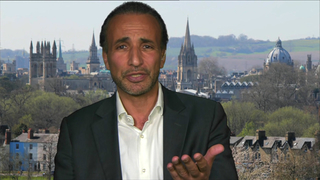
More than 100 cities and one state have adopted resolutions condemning the USA PATRIOT Act. But last month, Arcata, California, took it a step further. The Arcata City Council adopted a city ordinance that makes cooperation with the PATRIOT Act a crime. Starting this month, any city department head who voluntarily complies with investigations or arrests under the PATRIOT Act will be fined $57.
The USA PATRIOT Act gives the government new powers to snoop on citizens, including the use wiretaps and electronic surveillance and gathering information from public libraries. Opponents say it violates civil liberties; supporters say it helps fight terrorism.
Transcript
AMY GOODMAN: More than 100 cities and one state have adopted resolutions condemning the USA PATRIOT Act. But last month, Arcata, California, took it a step further. The Arcata City Council adopted a city ordinance that makes cooperation with the PATRIOT Act a crime. Starting this month, any city department head who voluntarily complies with investigations or arrests under the PATRIOT Act will be fined $57.
The USA PATRIOT Act gives the government new powers to snoop on citizens, including using wiretaps and electronic surveillance and gathering information from public libraries. Opponents say it violates civil liberties; supporters say it helps fight terrorism.
We’re joined now by David Meserve of the Arcata City Council, who authored the ordinance.
Welcome to Democracy Now!
DAVID MESERVE: Thank you very much, Amy.
AMY GOODMAN: It’s good to have you with us. So, tell us about, well, this very unusual legislation. A lot of legislation around the country against the USA PATRIOT Act, but yours has teeth.
DAVID MESERVE: Well, back in January, we were among the, at that time, about 30 cities that had passed resolutions against the PATRIOT Act. And we figured we just would take it a step further and actually pass an ordinance that made compliance with the PATRIOT Act illegal, with unconstitutional portions of the PATRIOT Act. And basically, what it does is remove city officials from the chain of command in the enforcement of unconstitutional provisions of the act. So we’re just saying that our city, our city officials will not cooperate with any unconstitutional provisions.
AMY GOODMAN: And what has been the response of the government?
DAVID MESERVE: There has been no real response. We like to say — and we haven’t really been requested to do anything by the federal government. We like to say that this is a preemptive attack in defense of the Constitution, to borrow some words from our resident. But we do feel that — you know, the Justice Department has said that it is — that federal law trumps local law, and that, therefore, this law doesn’t really mean anything. We like to think that it really does.
We go back to the Alien and Sedition Acts of 1798. And at that time, it was another time of French bashing, and the federal government, under Adams, was trying to declare war against France. And they made it illegal to criticize the government, and they made things much harder on anyone trying to get citizenship. And at that time, both Madison and Jefferson, in Virginia and Kentucky, respectively, passed resolutions in which they said that the duty of the federal government under the Constitution is that the Constitution is a compact to secure our rights, and when the federal government breaks that compact by limiting our rights or limiting our liberties, then it’s the responsibility of the states or, by extension, municipalities to stand up and say, “No, we won’t comply with these laws.”
AMY GOODMAN: Arcada is city of, what — 16,300 miles north of San Francisco, one of the — what was the first city with a Green Party majority, Greens holding two of five seats on the council. Would that explain how this got passed?
DAVID MESERVE: You know, to some extent it does. But the thing about the opposition to the PATRIOT Act, I think, is that although progressives have always been firmly against the progressive [sic] act and favoring civil liberties, this happens to be an issue that really bridges the left and right spectrum of the political spectrum, because people on the right and people in the middle all want to defend the Constitution. Now, those on the far right love the Bill of Rights. They may have — their favorite amendment may be the Second, but they still love the Bill of Rights. And people all across the political spectrum want to defend our civil liberties. So, this is — I think what’s exciting about this movement and the fact that there’s over 100 cities that have passed resolutions is that it really bridges the traditional political boundaries. We have an opportunity here. You know, mainly your listeners are probably towards the left, but we have an opportunity here to work with people all across the spectrum and to actually cause a little dis-ease in Washington, I would hope.
AMY GOODMAN: Well, I want to thank you very much, David Meserve, for joining us from Arcata, California, again, just passed legislation through the City Council that would fine law enforcement or anyone that tried to enforce the USA PATRIOT Act. And there is a resolution going through the New York City Council today that would also speak out against the USA PATRIOT Act.












Media Options